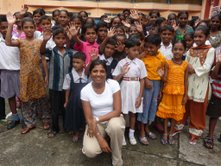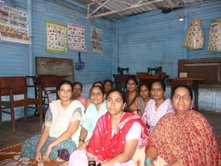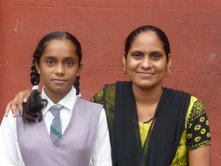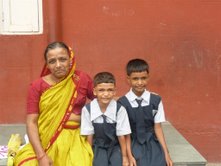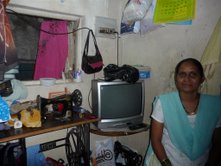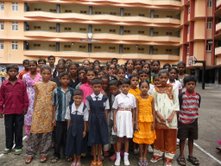Contribute
| Lokvani Talks To Sonali Gupta |
Nirmala Garimella
11/21/2009
Wide Horizons for Children, Inc. is a 501(c)(3) child welfare and adoption agency, dedicated to improving the lives of the world’s most disadvantaged children through adoption and humanitarian aid. Through their 35 year history we’ve brought over 11,000 children home to loving families all over the United States. Additionally they have provided more than $11,000,000 in humanitarian aid for nutrition, medical care, educational support, clean water, family and community empowerment, orphanage repair, and other services to children and families in Asia, Africa, Eastern Europe and Latin America. One of their key initiatives is Child Sponsorship. Wide Horizons runs Child Sponsorship programs in five countries – Sonali Gupta works in their Humanitarian Aid Team at WHFC. She was on a recent visit to India and experienced firsthand some of its programs. Share with us the accomplishments of the India Program? Our accomplishments in India have been significant. During this past year, in partnership with Family Service Centre, we have expanded and strengthened our community-based initiatives for undereducated women and children in the Colaba market Slum in Mumbai. The lives of thousands of children and their families have been changed through improvements to their health, income, and education level. Even more importantly women and children have been empowered to participate in decisions that affect their futures. We continue to partner with SOFOSH at their new center in Pune for orphaned children with special needs. The care provided for these children is some of the best in the country, and the caregivers have been nationally recognized for their extraordinary efforts. Three important observations to sum it all up: · Integrating severely disabled and abandoned children living on the fringes into mainstream society through comprehensive community empowerment and education initiatives. · Higher rates of education and school retention in the poorest urban slums ( this is an achievement for our sponsorship program) · Effective counseling and adult education programs for marginalized families to become emotionally and financially self-reliant The Mahila Mandal in Azad Nagar slums – how do you motivate them to stay involved? The Mahila Mandals are motivated to stay involved primarily through the following three reasons: 1) Ownership: The Mahila Mandals are motivated to stay involved because it is programs that they have identified as needs for their own communities. They have seen the problems, brought them forward for resolution, and then are included in the solution. Rather then the projects being FSC projects that the Mahila Mandals work on, the projects are Mahila Mandal programs that FSC assists in finding sustainable solutions for. 2) Success: The Mahila Mandals are also motivated by the success that they have seen through the implemented projects. Through their efforts they have seen changes in their individual, family, and community life that are very notable, particularly among India's slum communities. Their success helps them see that more success is possible if they keep striving for it. 3) Support of FSC and the local community: FSC provides the Mahila Mandals with information on government and private programs that are available to help solve problems. When there are no other solutions, then FSC steps in to work with the Mahila Mandals on implementing a project. The Mahila Mandals are provided with necessary training to be successful. The local community is also supportive of the efforts and they work with the Mahila Mandals to implement solutions. Who are the social workers? Are they trained by WHFC? The social workers are trained social workers (educated in India's universities as social workers). They receive additional on-the-job training by FSC. What kind of resources or info they share with the Mahila Mandals that the women had no access to previously? FSC provides these women with information about government programs for slum communities. While these programs are not kept secret, often the people are not aware of the actual programs that exist. FSC helps them to access these programs. FSC also taps into local, private initiatives - such as food from local hotels for TB patients, education information, and medical care. How do you make sure there is no misuse of funds and corruption? We require ongoing financial and programmatic reporting from FSC on funds that WHFC sends. We also request copies of official audits that NGOs in India are required to get. In addition to this we conduct onsite monitoring visits where spot-checks on financial records may be performed Do sponsors have direct access to their children they support? Sponsorship creates a personal connection between the Family and the sponsored child. Upon matching with a child the family will receive a child’s profile and photo and begin corresponding with them. The Sponsoring family will receive annual updates, letters and photos. Sponsors can send letters and pictures to their sponsored child through WHFC. If a family is traveling to India we can arrange through FSC a meeting with their sponsored child to see what a significant difference with a little bit of sponsorship support. On what basis are sponsorships awarded? In order to be eligible for sponsorship, families must enroll their children in school (public school is free) - sponsorship does not cover tuition costs (but rather covers school materials, uniforms, etc). Families show their commitment to the program and their responsibility for their child by enrolling their child in school. Mahila Mandals are aware of the financial and social situation of the families in their slum and work with FSC social workers to identify the children most in need. Before awarded sponsorship, these families go through a thorough assessment. WHFC plans to support the Balwadi project in the future ? How does the concept work Balwadi Project (pre school project), exist in slum communities in India for many years. The residents in these communities are generally daily wage earners, lack basic education and have no awareness about basic health and hygiene issues. Education has a low priority in these homes, with the result that there is a poor school enrolment rate in these areas. It is common to see 8 year olds out of school roaming the streets aimlessly. In such an underprivileged society, a good pre school education becomes important to initiate the process of learning, so that the child is equipped with the necessary skills to pursue a primary school education as also to motivate the illiterate parents to send their child to primary school. Balwadi is conducted with one teacher and one helper. A project coordinator is responsible for the overall functioning of all the Balwadis. The Balwadis are conducted from Monday to Saturday for three hours-the timings vary according to the location. The Montessori medium of instruction is followed in the Balwadis. The curriculum includes basic language, maths, songs, stories, creative activities, games etc. The stated objective is to prepare the child for a primary school education-but with a difference.
You may also access this article through our web-site http://www.lokvani.com/
